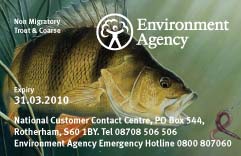New system means more investment in fishing and river quality
The UK’s oldest and most popular participator sport is being brought bang up to date with a new look rod licence – and a raft of other changes too.
From 2nd March anglers buying their 2009/10 rod licences will notice a few changes – the most obvious being the licence’s stunning new look. The Environment Agency has ditched the old fashioned paper licence and opted for a modern water resistant credit card sized licence – creating the look and feel of a club membership card. Drawn by Wales-based artist David Miller, the coarse fishing licence features a perch lunging for a baited hook, while the salmon licence shows a silvery grey salmon. The licences feature fewer personal details on them, to reduce the risk of identity fraud should the licence be lost or stolen.
The new licences are still available through the post office, online, over the phone and by direct debit, but will no longer be issued on the spot. Instead, each customer will be given a unique reference number at the point of sale, which will allow them to fish immediately. The licence will arrive in the post within seven days.
Short term licence holders – one and eight day licences – will no longer be given a licence. Instead they must take their reference number along with them which can be checked by a bailiff if required.
Mat Crocker, Head of Fisheries at the Environment Agency said: “The new-look rod licence will deliver real benefits to anglers. The system is now cheaper and quicker to administer – which allows us to spend more licence money on habitats improvements and fish stocking, while keeping the increase in rod licence fees to a minimum.”
Rod licence sales generate over £23 million in revenue each year, which the Environment Agency ploughs directly back into the sport.
The fee helps pay for habitat improvement works, fisheries research, monitoring and advice to owners on fish stocks. It also funds the specialist equipment used in fish rescues and enforcement to protect fish stocks, as well as the Environment Agency’s fish farms. These farms provide hundreds of thousands of fish which are stocked to improve popular angling spots and rivers across England and Wales.
Improved river quality over the past decade has also helped boost fish stocks for the sport. Thanks to better water quality and improved habitats, sites that were devoid of fish just a decade ago are now supporting good numbers of fish and a variety of species.
Environment Agency research shows that freshwater angling in England and Wales generates around £1 billion to the UK economy every year.
For more information about fishing in England and Wales visit www.environment-agency.gov.uk/fish.






